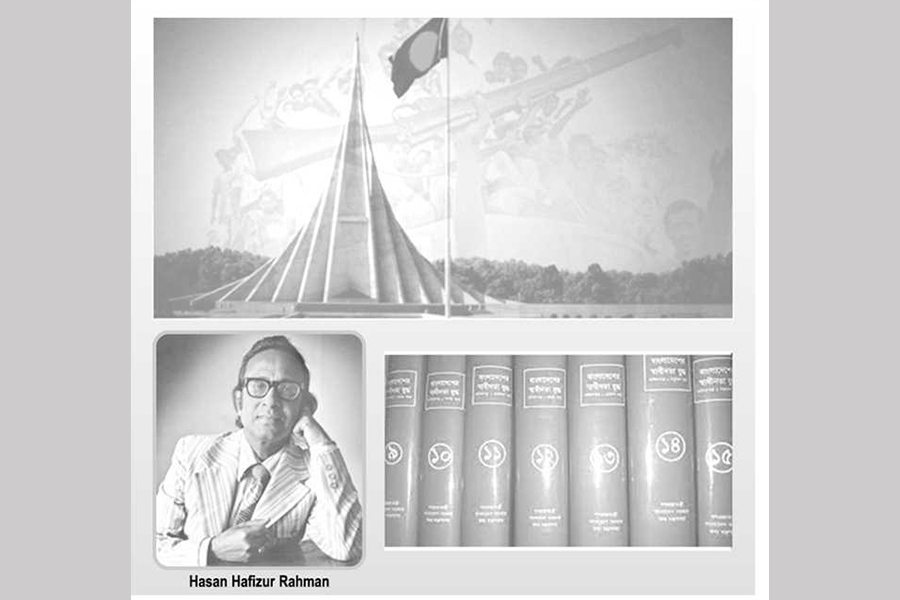
Published :
Updated :

The 1971 Liberation war documents project didn't produce narrative and opinions, but documents. There are however, three volumes where interviews and remembrances can be found but basically they are documentary in nature. The volumes don't carry any opinions, no matter how noble or significant. It's a collection of 15 volumes aiming to preserve the evidence of history that led to and of 1971. This was the project objective in the second phase after revising the original project supposed to produce four volumes of documents and two volumes of narrative history.
The History Project had an interesting combination of workers, mostly young and fresh and some academic researchers. They were not University teachers but from various research outfits and represented a wide stream of thoughts and ideas. Some were mainstream like Dr. Ratanlal Chakrabarty--later of Dhaka university, or Dr. Tayebul Hasan of Jahangirnagar University or Dr. Sukumar Biswas of Bangla Academy. There were others too. This included the four staff researchers.
THE STAFFERS: There were three of us who were students of Dhaka University History department. Shah Ahmed Reza and myself had passed out the same year doing our masters in different topics. And there was Wahidul Haq, a year junior to us who was responsible for keeping all the materials and documents organised and safe.
The fourth person was more interesting and older. Imamur Rashid bhai had a background in teaching, media and full time politics and was a loyalist of the Soviet led CPB. He was a good man but the problem was that Reza was a close follower of Maulana Bhashani, having lived in Bhashani's Tangail residence for months and 1971 in jail. Imam bhai had his stints there too.
I was also known for my "Marxist' views and they were certainly not of the Soviet variety. So let's say it was clear that ideologically, the office had a variety of thoughts and ideas bubbling.
That however didn't prevent us from working together despite our more than occasional political arguments. And in many ways it was a great combo as they tried to make sure the documents collection and procession was inclusive.
THE AUTHENTICATION COMMITTEE: The apex body was the Authentication Committee whose responsibility was to make sure the documents included in the volumes were authentic. Hasan Hafizur Rahman bhai made the list after discussing the names with his peers and advisors. He got everyone on the hit list except one.
The committee was headed by Prof. Mafizullah Kabir of History Dept., Dhaka University. Others were Prof. Salahuddin Ahmed of Dhaka , Prof. S.A. Akanda of Rajshahi University, Prof. Anisuzzaman of Chittagong University, Dr. Shamshul Huda Haroon of Pol. Science of DU, Dr. Enamul Haque of the National Museum, Dr. Karim of the National Archives and Dr. K.M. Mohsin of DU History department.
The one person whom Hasan bhai tried to include but who refused was Prof. Ahmed Shareef of the Bangla department of DU. He refused and instead offered a job in the DU to Hasan bhai which he also duly refused. When I conveyed the news to Prof. Sharif, he took a large piece of paper and wrote , " I don't get involved with any GOB related activities. "
THE MIXED BAG MAGIC: Several factors made our work possible that turned the 15 volumes of documents the primary baseline data source for research on 1971 history.
Project Director Hasan Hafizur Rahman had enormous credibility and goodwill in all spaces which allowed us to approach many people in our search for documents. However, that didn't include the government offices which didn't part with the documents even after promising to do so. They included the armed forces, the foreign ministry and even the Home Ministry.
However, the Defence ministry was co-operative and the Mujibnagar (volume 3) book was based on documents obtained from here, a truly precious find. While the armed forces didn't hand over the documents and later may have published them on their own, we were allowed to visit the cantonments and interview many war veterans. Similarly, documents from private archives of diplomat archives came to us directly and helped us frame their work.
The Authentication Committee was truly a composition of people with integrity who put history above their own ideological positions. They put inclusion, accuracy and authenticity above all making sure that all documents that qualified for inclusion were done so. With that came their relationship with us, we their students.
In the end, what seemed to work best was a common objective and a sense of willingness to be inclusive. Many people with mixed ideas who work together can make things happen as long as there is mutual respect. It's these elements that seem to be missing now not just in historical research but in other spaces as well.


 For all latest news, follow The Financial Express Google News channel.
For all latest news, follow The Financial Express Google News channel.